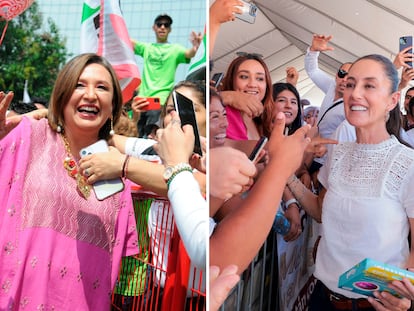Jorge Álvarez Máynez, the candidate that no one expected on Mexico’s presidential ballot
The last candidate to join the presidential race has arrived with the advantage of being a little-known face. But he has room to become an uncomfortable rival
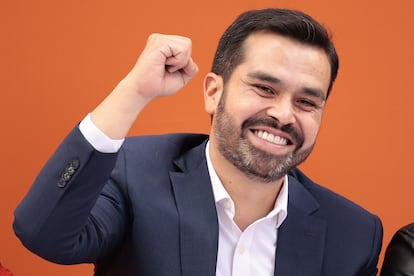

Rivers of ink have flowed in recent months, as journalists try to guess who was going to be the Citizen’s Movement (MC) candidate for the presidency in the 2024 elections in Mexico. Would it be Samuel Garcia, Luis Donaldo Colosio Riojas, Marcelo Ebrard, Patricia Mercado, Enrique Alfaro, or Dante Delgado? The name of Jorge Álvarez Máynez was not on many of the lists. It was not mentioned in the forecasts, nor did it appear in the polls. In the end, the orange party opted to pit their leader in the Chamber of Deputies against the ruling party’s Claudia Sheinbaum, with Xóchitl Gálvez hot on their heels.
The person in charge of putting an end to the mystery was Samuel García himself, who released a video in which he handed the baton over to Álvarez Máynez like a relay runner in the longest presidential race in history. MC removed its most reliable deputy from the bench to give him a new mission: no longer as a campaign coordinator, political operator, or the party’s voice against the anticipated acts of his rivals, but as the star, “the newest,” and the most “chillaxed of all.” The ballot is complete for next June’s elections with a surprise contender who arrived at the last minute.
As is the case for any substitute, the first obstacle in Álvarez Máynez’s path has been having to deal with comparisons. Álvarez Máynez will have to see if he fits into the suit originally designed for the governor of Nuevo León, or if he will have to make adjustments. A man with the complete trust of the leadership and with specific weight behind closed doors, the most obvious criticism of “the new one” is that he has a much lower profile than his predecessor.
As an example, few newspapers dedicated this Wednesday’s front pages to the appointment made by Dante Delgado’s party. The main news programs made a brief, passing mention, after an extensive review of the national and international agenda. MC’s rivals did not miss the opportunity to attack that weak point. “We already won!” celebrated Alejandro “Alito” Moreno, the national leader of the Institutional Revolutionary Party (PRI), upon learning that Álvarez Máynez was the MC’s chosen candidate. There was also some friendly fire. Governor of Jalisco Enrique Alfaro is convinced that other opposition forces had to join together to defeat Morena, the ruling party, and did not hold anything back when he said that his party was making a mistake by “imposing” Álvarez Máynez. “If that is the path they want to take, that’s up to them,” he concluded on his social media.
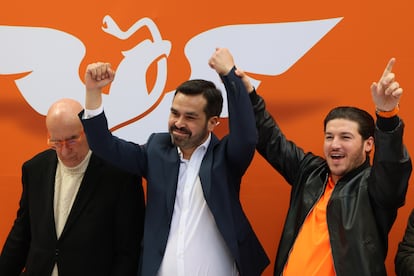
Álvarez Máynez is not new to the campaign. When the president, Andrés Manuel López Obrador, took the baton to establish the rules of succession last June, the MC deputy came out to criticize his rivals for wanting to take “five months’ illegal advantage” regarding the deadlines the law dictates. The 38-year-old legislator was right, but when the electoral authorities preferred to look the other way to avoid getting into trouble, and when the National Action Party (PAN), the PRI, and the Party of the Democratic Revolution (PRD) decided to go ahead as well, the battle became quixotic. The campaign that was not a campaign, with rallies labeled as “party assemblies” and candidates disguised as “coordinators,” continued as if nothing had happened.
MC was the only registered party that waited until the end of 2023 to show its hand, partly as a declaration of intent to distance itself from “the old politics,” and partly to keep its options open. The strong men of the party had several challenges to decide whether to join the opposition front, whether to bet on Ebrard’s external candidacy, or whether they finally dared to go it alone for the first time with their own candidate in a presidential election.
Álvarez Máynez always had a place at the table alongside Delgado, García, Senator Clemente Castañeda, and Alfaro, until now. From the beginning, he seemed more comfortable in the role of strategist or attendant, but always behind the scenes. In November, when Ebrard was no longer an option, Samuel García came forward and Álvarez Máynez was named campaign coordinator. He held that position for less than two weeks, as the governor of Nuevo León had to step aside to resolve the political crisis that rocked his state in the first week of December.
“In just 10 days, Citizen’s Movement sent PRIAN [the PRI and PAN, two of the country’s main political parties] to second place,” Álvarez Máynez is seen saying in a campaign ad that MC launched on December 27, still in his position as national coordinator, and with no one suspecting that he would step forward. The revelation came this week, practically a month after García’s shipwreck. “He is the best presidential candidate that MC could have and starting June 2, Mexico will have in you a great president,” said Delgado when making Álvarez Máynez’s registration official.
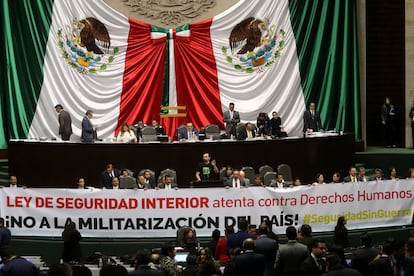
Álvarez Máynez has known how to embody the contradictions that have accompanied MC in its short history: its electoral program and its marketing commitment. He is the young politician who in Congress opposes militarization and the current government’s attack on the autonomous bodies. He is the one fighting the battle in the National Electoral Institute to denounce cheating and bungling by his rivals, the one who has said time and again “not even with the PRI.” But he was a member of the PRI for three years. It was he who agreed to let García reveal him as the party’s choice with chips and beer in hand, the one who doesn’t make faces when they tell him that the speech has to be light, or that the political message he has to convey is to put on fluorescent orange sneakers.
With a degree in International Relations and two master’s degrees in Constitutional Law and Human Rights and Public Administration, he began his political career as councilor in his hometown of Zacatecas in 2004, while he was still studying at university. Part of a left-wing family — his father was the founder of the Communist Party — he was the founding director of the newspaper La Jornada in Aguascalientes and he was first active in the PRD. In 2009, he left that political group and a year later had a brief stint with the defunct New Alliance, which nominated him as a local deputy for Zacatecas in coalition with the Green Party and the PRI, which counted him among its ranks from 2010 to 2013. Typical of the paradoxes of Mexican politics, the PRI has not hesitated to bring up Álvarez Máynez’s PRI past to undermine his credibility. “Imagine the shame for him: criticizing the PRI and he was a PRI deputy,” Alito Moreno declared last May.
In 2013, he joined Citizen’s Movement with the task of building a countrywide framework and stamping his own identity on a party that had just changed its name two years before and could not shake off the label of López Obrador’s satellite. In 2015, he arrived as a federal deputy, reconfigured as a harsh critic of the PRI during the government of Enrique Peña Nieto and later, of the legislative alliances between Morena and the PRI to advance López Obrador’s priority initiatives. In this administration, he opposed the president’s controversial electoral reform known as “Plan B,” questioned the management of the pandemic, and rejected the reforms to the electric industry promoted by the ruling party.
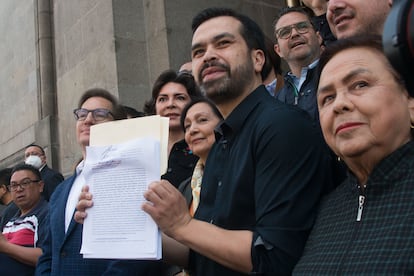
“Our fight is not for the next election. We understand that the country is not going to change by removing this president and installing another. Our fight is to change the system,” he says in his personal blog, where he cites Bernie Sanders, Alexandra Ocasio-Cortez, Gabriel Boric (Chile), and Íñigo Errejón (Spain) among his political influences. The last candidate to join the presidential race has arrived with the advantage of an eventful internal process and of being a little-known face, but he has room to be an uncomfortable rival, agile in the debate, and able to speak, through substance and his manner, to young voters: he is 20 years younger than his rivals. But for that he will have to dare to find his own voice. In the end, it will be a three-way battle that will be decided at the polls.
Sign up for our weekly newsletter to get more English-language news coverage from EL PAÍS USA Edition
